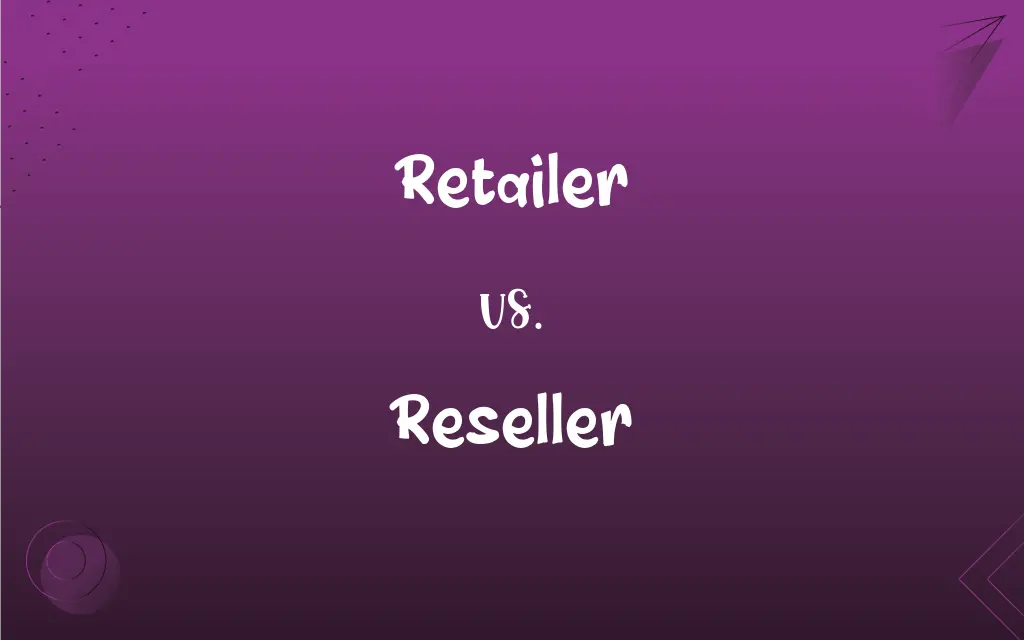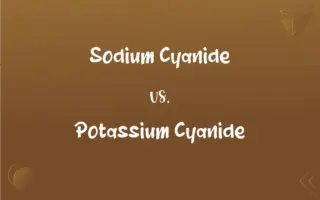Retailer vs. Reseller: What's the Difference?
Edited by Aimie Carlson || By Janet White || Published on December 9, 2023
Retailer sells goods directly to consumers. Reseller buys products to sell them again, often to different customer segments.

Key Differences
Retailers are businesses or individuals that sell goods directly to end consumers, often through physical stores or online platforms. They typically purchase products from manufacturers or wholesalers. In contrast, resellers buy products from manufacturers, wholesalers, or even retailers, to sell them again, usually to different markets or customer segments, often adding value through bundling or differentiating services.
The primary function of a retailer is to provide a final point of sale for the consumer, ensuring accessibility to various products and services. Resellers, however, act as intermediaries, acquiring products to sell them to either end consumers or other businesses, often targeting niche markets or specific customer needs.
Retailers often build relationships with customers directly, focusing on customer service and experience to foster loyalty and repeat business. Resellers, on the other hand, might not have a direct relationship with the end consumers, as they might operate in B2B (business-to-business) markets or online marketplaces.
In terms of product range, retailers usually maintain a diverse array of products to appeal to a broad customer base. Resellers, conversely, might specialize in specific product categories or brands, offering expertise and specialized services in those areas.
Retailers play a key role in brand representation and are often the face of the product to the consumer. Resellers can provide additional market reach for products, tapping into new customer bases and distribution channels that might be inaccessible to the original retailer.
ADVERTISEMENT
Comparison Chart
Primary Role
Sells directly to consumers
Buys products to resell
Target Market
End consumers
Varied, including consumers and businesses
Customer Relationship
Direct with consumers
May not directly deal with end consumers
Product Range
Broad and diverse
Often specialized or niche-focused
Market Function
Final point of sale
Intermediate sales, expanding market reach
ADVERTISEMENT
Retailer and Reseller Definitions
Retailer
A business that sells goods or services directly to consumers.
The local retailer offers a wide range of electronic gadgets.
Reseller
An entity that may specialize in specific product categories for resale.
The online reseller has become popular for its extensive range of vintage clothing.
Retailer
A seller operating either through physical stores or online platforms.
This online retailer has revolutionized shopping with its fast delivery system.
Reseller
An individual or company that buys products to sell them again.
The reseller specializes in refurbished electronics, offering them at competitive prices.
Retailer
A business that purchases products from suppliers to sell to the public.
The retailer sources unique artisan products from around the world.
Reseller
A seller who targets specific markets or customer segments with their products.
The reseller focuses on providing bulk office supplies to small businesses.
Retailer
An entity involved in the final step of the supply chain, selling to end users.
As a leading retailer, the store prides itself on exceptional customer service.
Reseller
A business that acquires goods from other sources and sells them, often after adding value.
As a software reseller, the company provides additional support and customization services.
Retailer
An entity that represents brands and products to consumers.
Being an authorized retailer, the store guarantees the authenticity of its luxury goods.
Reseller
An intermediary in the supply chain, selling products to different types of customers.
This reseller is known for distributing rare collectibles to niche markets.
Retailer
The sale of goods or commodities in small quantities directly to consumers.
Reseller
To sell again.
Retailer
Of, relating to, or engaged in the sale of goods or commodities at retail.
Reseller
To sell (a product or service) to the public or to an end user, especially as an authorized dealer.
Retailer
In retail quantities.
Reseller
A company or individual that purchases goods or services with the intention of reselling them rather than consuming or using them.
Retailer
At a retail price.
Retailer
To sell in small quantities directly to consumers.
Retailer
(also rĭ-tāl) To tell or repeat (gossip or stories, for example) to others.
Retailer
To sell at retail.
Retailer
A retail sales company or salesman.
Retailer
One who retails anything; as, a retailer of merchandise; a retailer of gossip; - used also of businesses, including large corporations; as, Sears, Roebuck is one the the country's largest retailers.
Retailer
A merchant who sells goods at retail
FAQs
How do retailers acquire their products?
Typically from manufacturers or wholesalers.
What is a retailer?
A business that sells products or services directly to consumers.
What is the primary focus of a retailer?
To provide accessibility to products and excellent customer service.
What does a reseller do?
Buys products from various sources to sell them again, often to different markets.
What type of products do resellers focus on?
They may specialize in specific niches or product categories.
Is online selling common among retailers?
Many retailers also operate online to reach a wider audience.
Can a reseller be part of B2B transactions?
Yes, resellers often operate in B2B markets.
Do resellers sell to end consumers?
They can sell to both end consumers and other businesses.
Do retailers have a direct relationship with consumers?
Yes, they often interact directly with their consumer base.
Can a reseller add value to the products they sell?
Yes, often through bundling, customization, or specialized services.
Are retailers important for brand representation?
Yes, they play a key role in representing and marketing brands to consumers.
Can a business be both a retailer and a reseller?
Some businesses function as both, depending on their operations and market strategy.
What are physical storefronts to retailers?
They are essential touchpoints for direct customer interaction and sales.
How do resellers expand market reach?
By tapping into new customer bases and using different sales channels.
Do resellers have their own supply chains?
They are part of the wider supply chain but may have specific distribution channels.
Do retailers offer diverse product ranges?
Yes, to appeal to a broad customer base.
Can resellers operate exclusively online?
Many resellers operate online to reach a wider market efficiently.
What is the role of retailers in the supply chain?
They are the final point of sale in the supply chain, directly interacting with consumers.
How do retailers maintain customer loyalty?
Through quality products, good service, and often, loyalty programs.
Do resellers focus on customer service?
Their focus may vary, but customer service can be a key aspect, especially in B2B transactions.
About Author
Written by
Janet WhiteJanet White has been an esteemed writer and blogger for Difference Wiki. Holding a Master's degree in Science and Medical Journalism from the prestigious Boston University, she has consistently demonstrated her expertise and passion for her field. When she's not immersed in her work, Janet relishes her time exercising, delving into a good book, and cherishing moments with friends and family.
Edited by
Aimie CarlsonAimie Carlson, holding a master's degree in English literature, is a fervent English language enthusiast. She lends her writing talents to Difference Wiki, a prominent website that specializes in comparisons, offering readers insightful analyses that both captivate and inform.































































